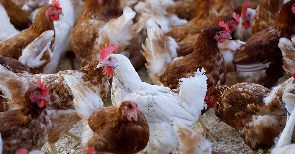Ghana has issued a high alert in response to the recent outbreak of Highly Pathogenic Avian Influenza A (H5N1), commonly known as bird flu, in Lomé, Togo.
The Volta Regional Health Directorate confirmed that more than 1,000 birds have already been culled as a result of the outbreak.
In a statement released on July 7th, the Ghana Health Service (GHS) addressed the situation, stating, "The Volta Regional Health Directorate wishes to inform all stakeholders about the outbreak of Highly Pathogenic Avian Influenza A(H5N1) in Lomé, Togo, which occurred on June 22, 2023.
The outbreak has led to the culling of approximately 1,450 birds out of a flock of 1,500. We urge all districts, especially those bordering the Republic of Togo, health facilities, and port health units to intensify their surveillance efforts for HPAI A(H5N1) disease."
The GHS emphasized the importance of residents in the region avoiding direct contact with wild birds and instead observing them from a safe distance. The statement also advised against touching surfaces that may be contaminated with saliva, mucus, or feces from either wild or domestic birds.
As a precautionary measure, the GHS recommended the use of protective equipment such as gloves and, if available, an N95 respirator or a well-fitting facemask with eye protection. Individuals were also cautioned to refrain from touching their mouth, nose, or eyes after coming into contact with birds or potentially contaminated surfaces.
Furthermore, the GHS called upon health facilities to enhance their surveillance activities for the detection of HPAI A(H5N1) disease.
This recent bird flu outbreak in Togo has raised concerns in Ghana, prompting authorities to take proactive measures to prevent the spread of the disease within their borders. Vigilance and adherence to safety precautions are vital in minimising the risk posed by this avian influenza outbreak.
Health News of Tuesday, 11 July 2023
Source: classfmonline.com













